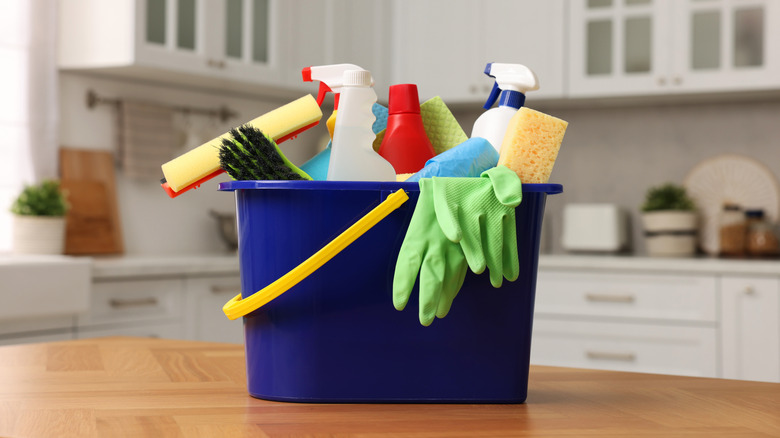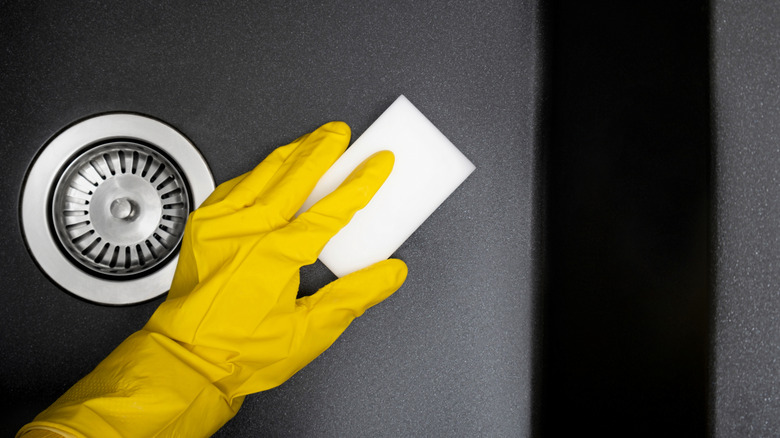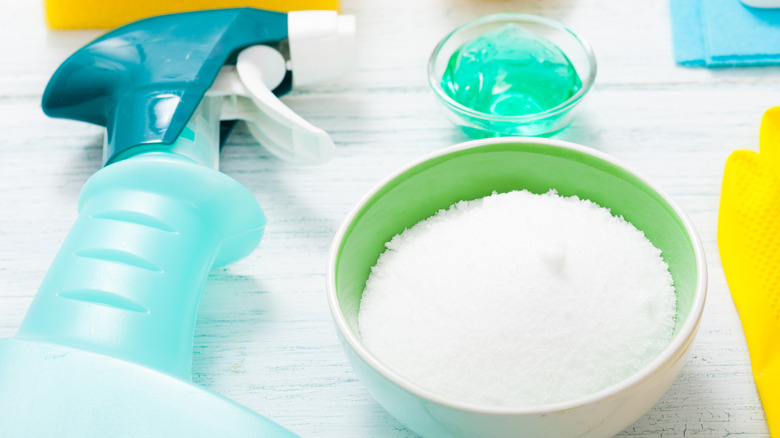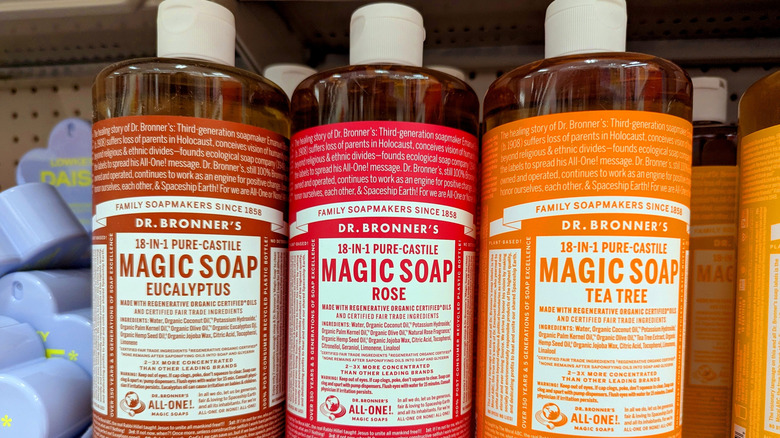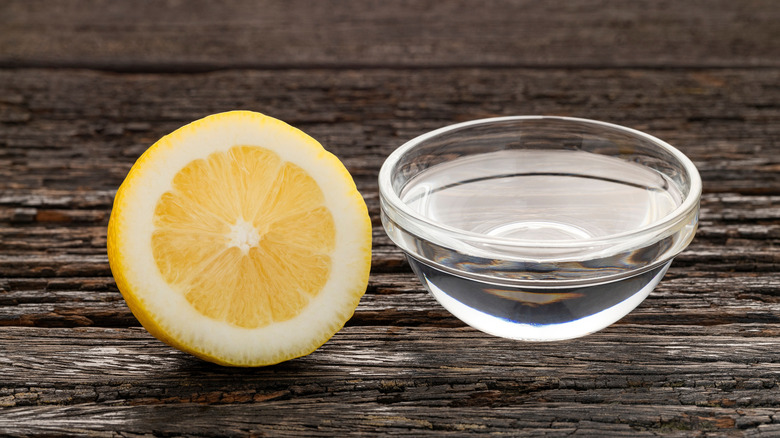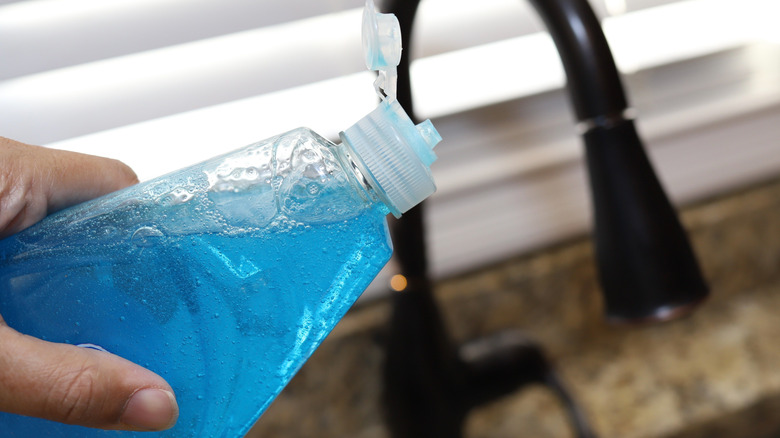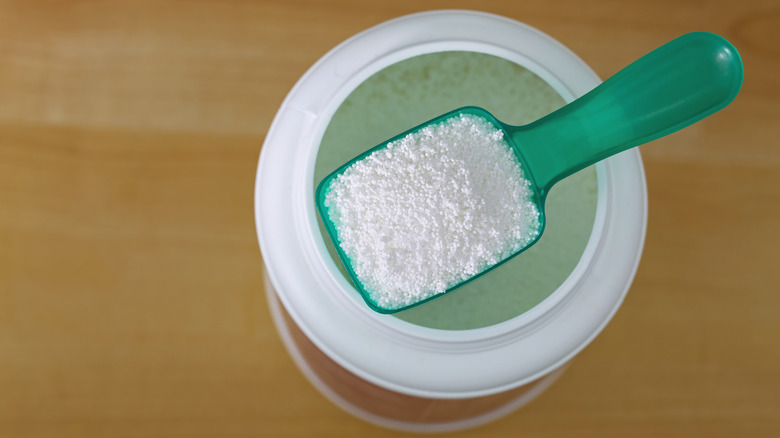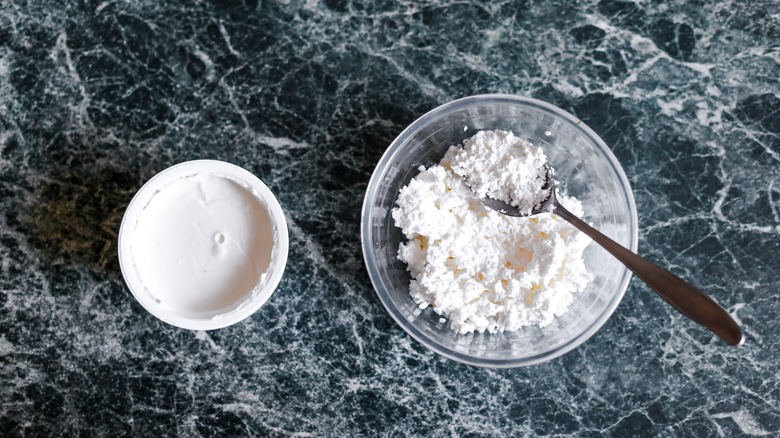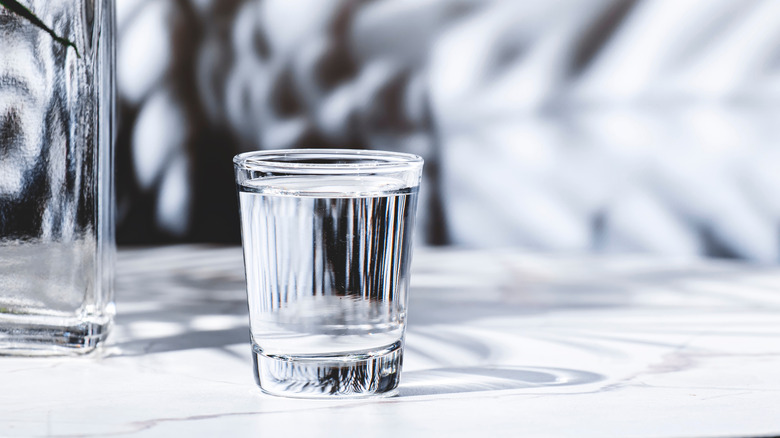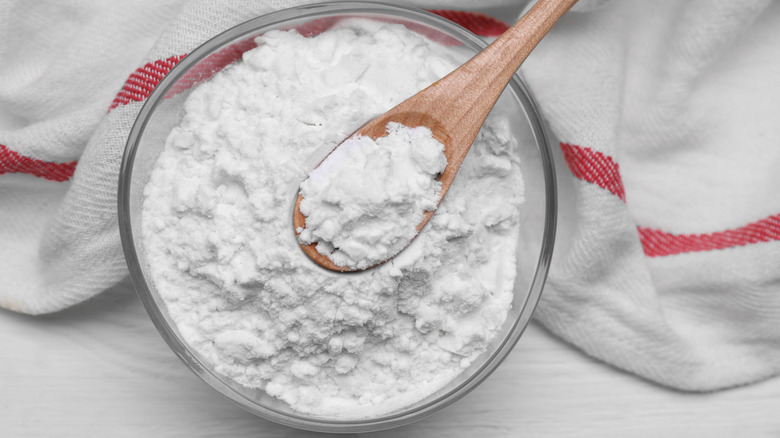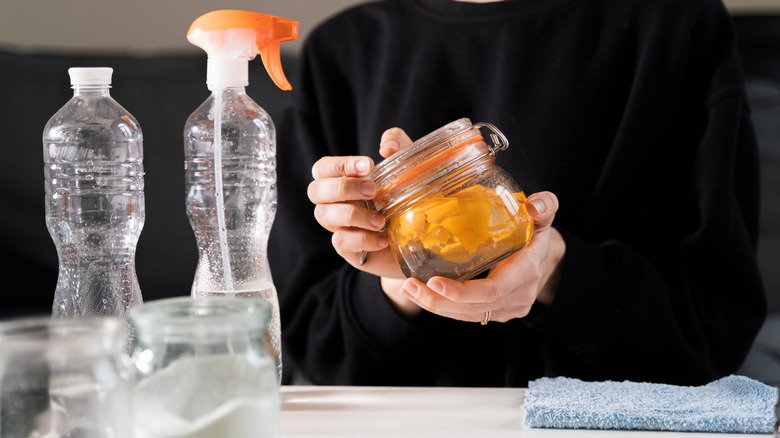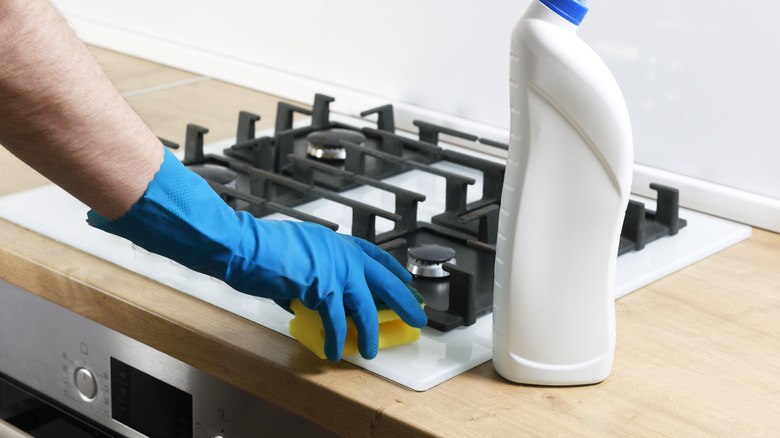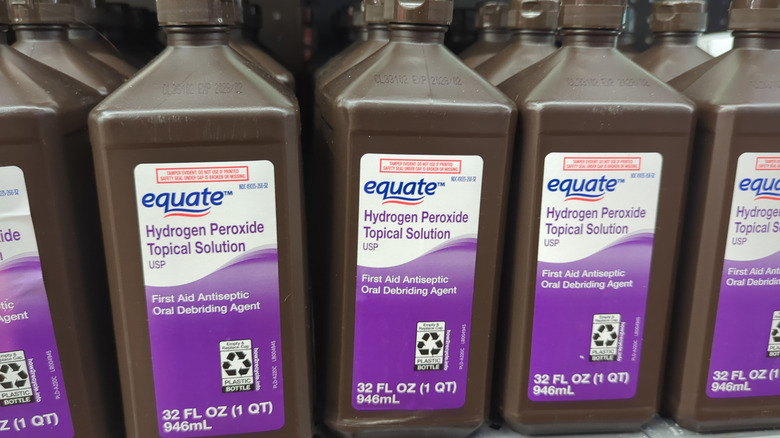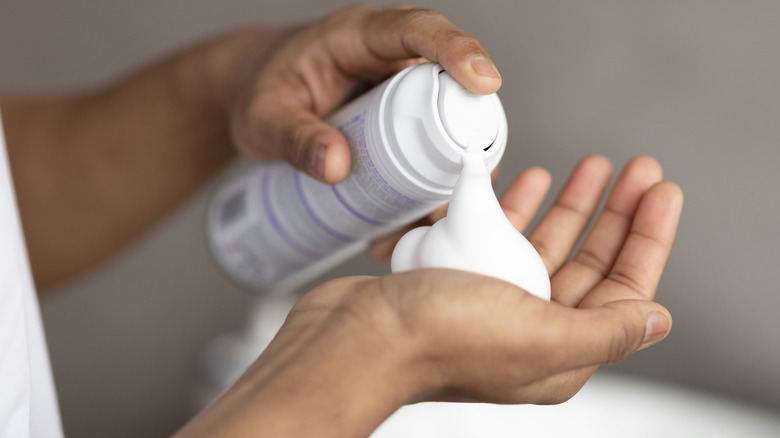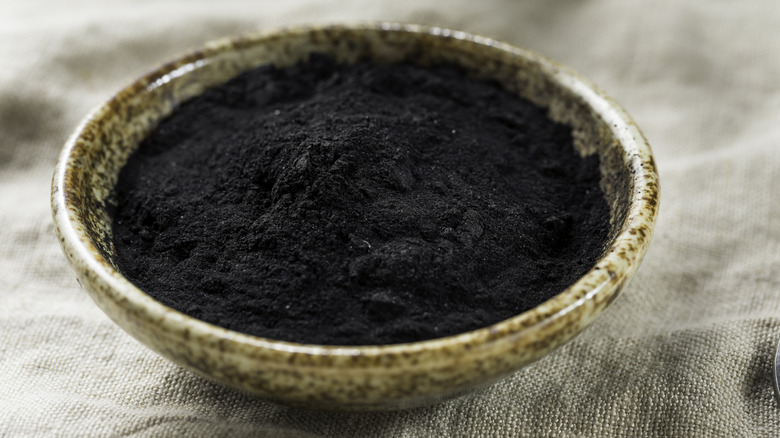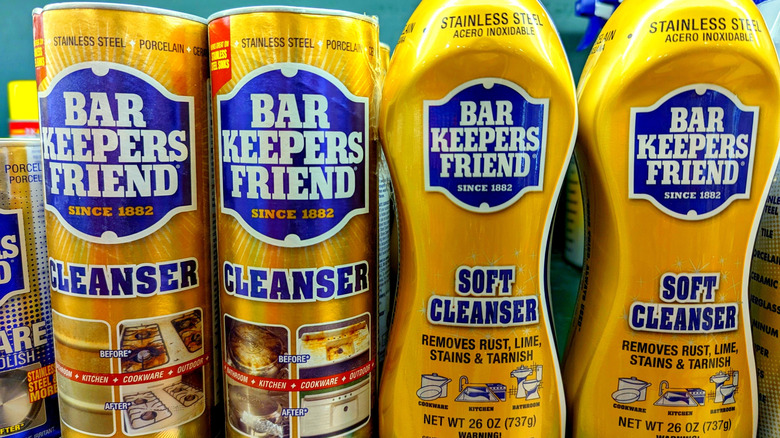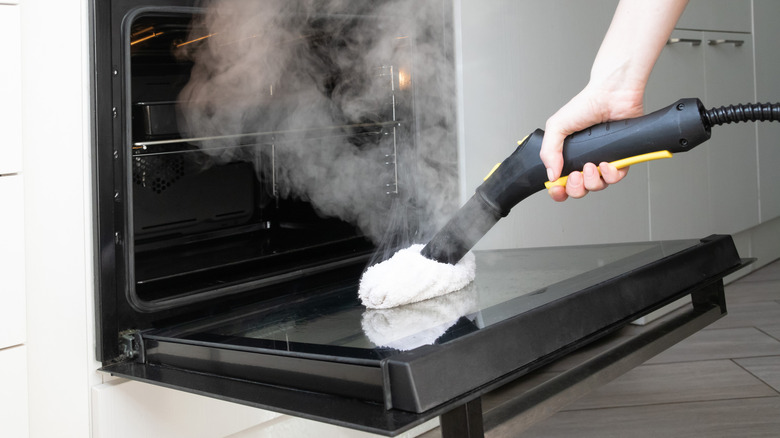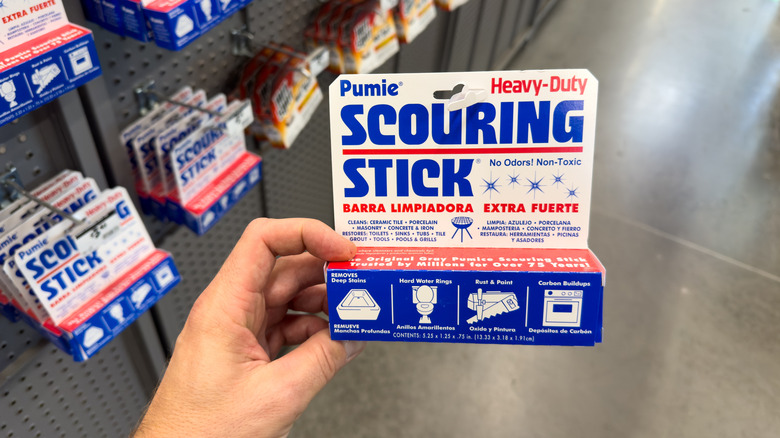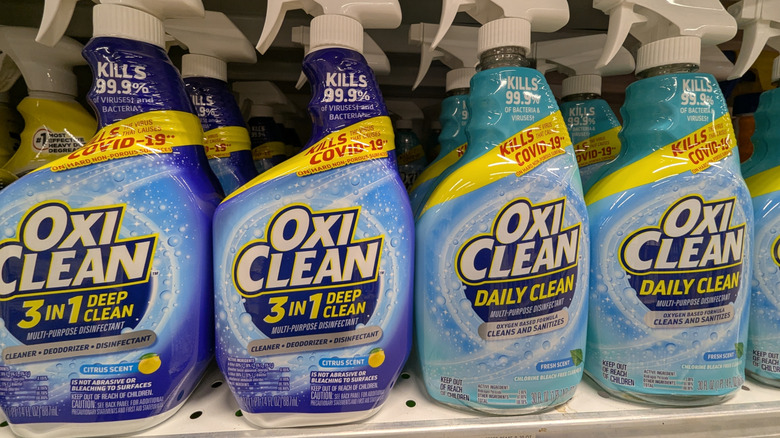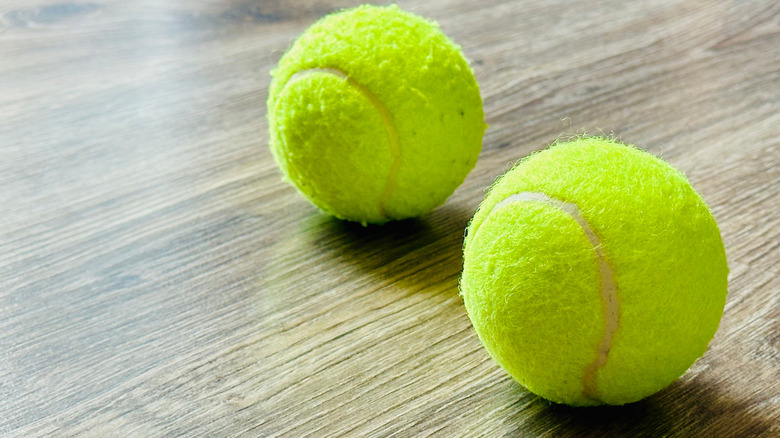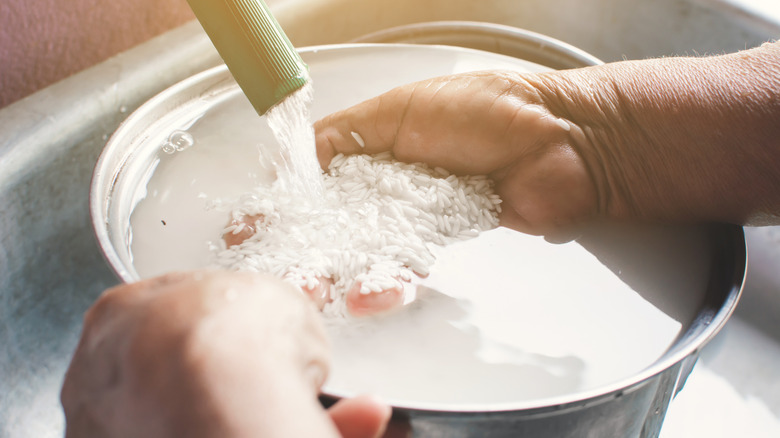All The Ways To Clean Your Kitchen Without Vinegar & Baking Soda
It's no doubt that the internet loves a good vinegar and baking soda cleaning hack, but for some kitchen environments and messes, they may not be the best solution. Though vinegar is a versatile cleaning tool, you should never use it on stone countertops like granite or marble, as vinegar's acidic nature could actually damage the surface. Meanwhile, baking soda's slight abrasive nature and grittiness aren't ideal for marble or glass. Conversely, both ingredients may not be strong enough to address some of the grimier, tougher messes to clean up in the kitchen. But the good news is that there are plenty of other solutions that effectively clean your kitchen. Some of these solutions are just as natural as vinegar and baking soda, too, while others harness the power of chemical cleaning agents.
Melamine foam, for example, is an incredibly effective cleaning tool that can cut through grease in ovens or on stoves but doesn't risk scratching glass. Meanwhile, DIY solutions made with dish soap and small amounts of rubbing alcohol can be the gentle alternative to cleaning stone countertops. Whatever you need to tackle those kitchen spills and messes, these are all the ways to clean your kitchen without vinegar and baking soda
Melamine foam sponge
Melamine foam – familiar to many of the sponges by the brand name Magic Eraser — is a slightly abrasive yet soft cleaning tool that's great to use on ovens and stoves to cut through grease. But it won't accidentally scratch or scrape the glass and metal surfaces, like baking soda pastes might. Lightly work the foam sponge into grease; it should cut through easily! While it works wonders to clean up mess, be sure to wear gloves then using melamine foam as the same finely coarse texture can actually cause rashes on bare skin.
Borax
Borax, or sodium tetraborate, is a naturally occurring substance formed from oxygen, sodium, and boron. Its slightly alkaline nature makes it a great cleaning agent and when mixed with water, the resulting solution helps to break down grease and grime effectively. It's a much stronger cleaner than baking soda, in particular, and it can tackle particularly rough messes that other natural ingredients aren't able to handle. When cleaning with borax, be sure to handle the substance safely by wearing gloves during use and washing your hands thoroughly after you're done cleaning.
Castile soap and lemon juice cleaners
If you're looking for something not as harsh as borax, vinegar, or baking soda, then pure unscented castile soap is a non-toxic and gentle cleaner, great to use on kitchen surfaces that you're afraid vinegar might be too strong for. Mix 1 tablespoon of the soap, a cup of lemon juice, a cup of water, and up to 20 drops of your favorite essential oil together in a spray bottle. After thoroughly mixing, spray evenly on surfaces and wipe up with a paper towel or a soft cloth for an even gentler clean.
Lemon juice and water
Another household use for lemon juice, craft a DIY solution mixing lemon juice with water to break down dirt naturally. Combine a cup of distilled water, a half cup of fresh lemon juice, and essential oil in a spray bottle for one of the most natural versions of a kitchen cleaner out there. Like with vinegar, though, this acidic combination might prove to be too strong for natural stone surfaces, but will work well on sinks and stove tops. Spray, let it sit for a few minutes, and wipe with a cloth.
Dish soap and rubbing alcohol
If that lemon solution feels just as harsh as vinegar, opt instead for a gentler dish soap and rubbing alcohol combo to avoid strong acids, but still clean effectively. For granite countertops in particular, mix a quarter cup of rubbing alcohol, up to five drops of dish soap, and a cup and a half of water (optionally with essential oils) to cut grease while minimizing damage. The idea here is to use a gentle, pH‑neutral or near‑neutral cleaner that still has degreasing and sanitizing power without degrading the stone.
Washing Soda
Another powerful alternative that tackles things that vinegar and baking soda might not be able to, washing soda can handle tough stains and can remove grease from kitchen surfaces. Also known by its formal name, sodium carbonate, you can use washing soda for general deep cleaning on non-aluminum surfaces. Washing soda is a stronger alkali than both baking soda or borax, making it an excellent, heavy-duty degreaser that easily cuts through built-up kitchen grease and stubborn grime. Like with borax, handle with gloves as it can irritate skin.
Cream of tartar and water
Cream of tartar (potassium bitartrate) is a crystalline powder and a natural byproduct of wine making. When mixed with water, it's a gentle yet effective scouring agent that's particularly good at removing tough discoloration like rust and hard water stains from sinks, porcelain fixtures, and non-aluminum metal — without scratching the surface. It's also gentle enough to be used on natural stone, unlike vinegar. For hard stains on surfaces, sprinkle some dry cream of tartar onto the spot, then buff away with a damp towel. For natural stone, create a thick paste and lightly scrub.
Grain alcohol
Grain alcohol, such as inexpensive, unflavored vodka, is a potent disinfectant that can break down stubborn stains like those pesky water spots on kitchen hardware. It's a fast-evaporating solvent that works as an odor-neutralizing bacteria-killer. When diluted with water, it creates an effective streak-free solution for stainless steel and glass surfaces, making it a coarse-free alternative to baking soda and a scent-free alternative to vinegar. If you find that you're working with particularly odorous or bacteria-harboring ingredients, a wipe down with a grain alcohol solution may do your kitchen some cleaning good.
Cornstarch
Cornstarch is the surprising pantry ingredient that can help address greasy spills or stains in the kitchen. Since it readily absorbs oil, clean up any spills by sprinkling dry cornstarch onto the spot, letting it sop up the liquid. Vacuum up the cornstarch, then wipe the surface down with water and dish soap. When mixed with water, it also creates a cleaning paste that works as a non-scratch, mildly abrasive scrub that helps pick away grime from pots, pans, and stainless steel sinks. It even works as a polish for your silverware.
Essential oils
Essential oils are the natural, sensory-friendly way of cleaning your kitchen. Depending on what kind of oil you choose, it has its own beneficial cleaning properties that'll have you forgetting all about baking soda or vinegar. Orange oil, for example, can cut through sticky kitchen grease due to its citric acid properties, while tea tree or thyme oils provide strong antibacterial and antifungal benefits. Oils effectively disinfect and sanitize high-touch and high-trafficked surfaces, like counters, without the risk of scratching or being overly strong.
Bleach
If you're looking to reliably sanitize your kitchen, bleach is one of the most potent disinfectants. At the same time, it requires diligent prep for safe use. While it does break down grime, it's best used on non-porous surfaces since it can discolor areas on natural stone. Be sure to wear gloves and even a mask as bleach can burn skin if it comes in contact. Bleach should also be diluted with plain water to minimize potency (about 1/3 cup bleach with a gallon of water), and never mix it with ammonia as it creates an accidental mustard gas.
Hydrogen peroxide
If using straight up grain alcohol isn't your thing, then a 3% hydrogen peroxide is a great germ-killing alternative. You'll need to store the chemical in a dark spray bottle since light can degrade the substance relatively quickly. However, when stored correctly, hydrogen peroxide is a handy disinfectant. Spray the dirty surface until wet, let it sit for up to 15 minutes, then wipe the surface clean with a paper towel. Word of warning: Never mix hydrogen peroxide with another chemical or substance, least of all vinegar since the chemical byproducts can be hazardous.
Shaving cream
Remember, back in the day, when we had to use shaving cream to clean our desk surfaces at school? Well, as it turns out, you can apply the same principle to cleaning your wooden kitchen cabinets and stainless steel appliances. Spray the cream into a microfiber cloth and rub it into the surface, scrubbing away at any caked-on food grime or buffing out marks. Afterwards, wet the cloth and wipe away any residual shaving cream. It removes water spots, food specks, dirt, and fingerprints without scratching or marking surfaces that vinegar or baking soda may do.
Activated charcoal powder
You may be used to seeing activated charcoal in your skincare, but it's also an under-the-radar cleaning tool that can absorb odors, oils, liquids, and even toxins. For greasy kitchen surfaces, create an activated charcoal paste with equal parts powder and water. Spread it over the surface, then carefully rub the paste in. With a sponge, wipe the paste away. While it's not the most effective on metals or on acidic stains, the activated charcoal acts like a series of tiny sponges on other materials, soaking up the oils and grease you want to get rid of.
Diluted oxalic acid
A key component in name brand cleaner Bar Keepers Friend, oxalic acid is another naturally occurring substance that cleans and brightens kitchen surfaces. It's strong, so it actually only makes up about 10% of Bar Keepers Friend's recipe; however, you don't need much to get your space squeaky clean. It's very good at buffing out tough stains, like rust or tarnishing, and works well on non-porous surfaces like ceramic and porcelain. Because of its acidic properties, though, avoid using this cleaner on natural stone, like marble, since it can cause scarring.
Steam cleaner
Sometimes it's the simplest, more natural methods that are gentlest, in a way that vinegar and baking soda aren't. Steam cleaning dissolves gross grime and dirt in kitchens, while also killing bacteria and viruses. Grab your steamer (yes, even your garment one), get it fired up, and concentrate the steam on any gunk, buildup, grime, or grease present in the kitchen. Let the gross stuff loosen up, then wipe it off with a microfiber cloth or paper towel. This is non-abrasive and non-acidic and can be used on counters, appliances, hardware, tiles, and grout.
Pumice stone
Pumice stones are manufactured for more than just pedicures; in fact, cleaning pumice stones have been around for many decades. It does follow the same principles, though, lightly buffing out stains on surfaces and working best on appliances like grills and iron cookware. Dip the stone in water, then gently rub the grime away. Because of how abrasive the pumice stone can be, avoid using it on materials like porcelain, fiberglass, or enamel. However, the stone is much stronger than powders and can tackle larger areas of mess.
Enzyme cleaners
Enzyme cleaners leverage the chemical reactions between complex molecules, breaking down into simpler cleaners to tackle accumulated proteins, grease, and other gunk on your kitchen surfaces. Various different enzymes have targets; lipase, for instance, breaks down fat and grease, making it a perfect base for kitchen cleaners. Though it sounds like you're working with strong chemicals that aren't natural, in reality enzyme cleaners are quite eco-friendly as they're non-toxic and biodegradable. They're effective, consistent, and just as natural as your vinegar and baking soda DIY solutions.
Tennis ball on a stick
While it sounds out-there, popping a tennis ball on a stick can help you tackle scuff marks on your kitchen floors and walls. It's no secret that kitchens are high traffic spaces, and a dark mark or two on the walls and floors come at no surprise in a well-loved room. But a tennis ball, stuck on a stick, can help you buff out those marks. Simply rub the ball gently on the mark to work it out. It's a mess-free alternative to using ingredients like vinegar and baking soda on your floors.
Rice water
Using rice water as a kitchen cleaner is common in many East Asian homes today, and it's no wonder given the rice water's characteristically abrasive nature. Particularly effective at washing cookware and getting leftover gunk off of surfaces, rice water is also fantastic at tackling mineral deposits and rust since it's slightly acidic (though not as much as vinegar). It does not, however, fare well against any fatty or oily buildup, so it's best to use any number of other grease-tackling suggestions on this list for those.
